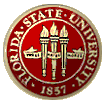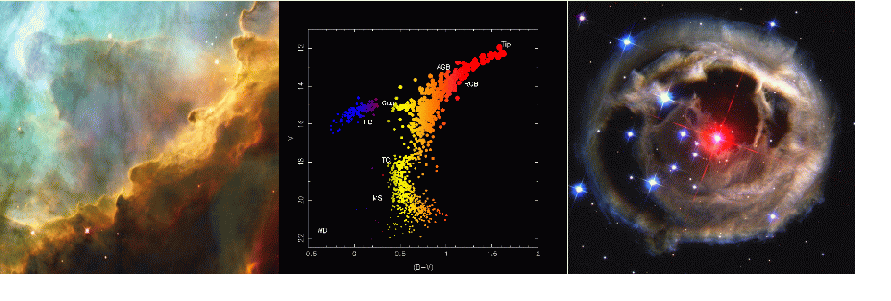


![]()


Course Outline:
|
Basic Equations: Hydrostatics, Energetics, time scales, energy transport |
|
The overall problem: Differential equations and boundary conditions |
|
Properties of Stellar Matter: Equation of State, opacities and nuclear reactions |
|
Simple stellar models: Polytropes, main sequence stars |
|
Early Stellar Evolution: From proto-stars to stars |
|
Post-Main-Sequence evolution of low mass stars |
|
Post-Main-Sequence evolution of massive stars |
|
Stellar Explosions: Core-collapse and thermonuclear Explosions, Gamma-ray bursts |
|
Final stages of stellar evolution: white dwarfs, neutron stars & black holes |
Textbook: Stellar Structure and Evolution, R. Kippenhahn & A. Weigert

Credits & Prerequisites:
Credit: 3 semester hours.
Pre-requisites: PHY-3221 - Intermediate Mechanics
Co-requisites: PHY-4604 - Quantum Theory of Matter A (recommended)
(Please contact the instructor if you do not meet the prerequisites)
Evaluation
of Performance:
The
course grade will be based on homework assignments, one midterm, and
a final exam. There will be weekly homework sets. All problems must
be solved and the assignment must be turned in one week later.
Assessment:
Homework (35%), Midterm (25%), Final (40 %)
Remark:
This course is part of the regular astrophysics curriculum and, currently, on a 3 year cycle including Nuclear Astrophysics, Stellar Physics and Radiation Transport, Stellar Atmospheres & ISM.
Indroduction to Astrophysics, Observational Technics, and Cosmology are offered yearly.
The Astro-Seminar is offered every semester.
Academic
Honor Code:
Students
are expected to uphold the Academic Honor Code published in he
Florida State University Bulletin and the Student Handbook. The first
paragraph reads: The Academic Honor System of Florida State
University is based on the premise that each student has the
responsibility (1) to uphold the highest standards of academic
integrity in the student's own work, (2) to refuse to tolerate
violations of academic integrity in the University community, and (3)
to foster a high sense of integrity and social responsibility on the
part of the University community.
ADA
Statement:
Students
with disabilities needing academic accommodations should: a) register
with and provide documentation to the Student Disability Resource
Center SDRC; b) bring a letter to the instructor from SDRC indicating
that you need academic accommodations. Please do this during
the first week of class.